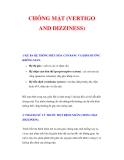
Dizziness and vertigo
Xem 1-1 trên 1 kết quả Dizziness and vertigo
-
1/ KỂ BA HỆ THỐNG ĐIỀU HÒA CÂN BẰNG VÀ ĐỊNH HƯỚNG KHÔNG GIAN. Hệ thị giác : mắt và các cơ nhãn cầu. Hệ nhận cảm bản thể (proprioceptive system) : các cột sau tủy sống (posterior columns), dây gân, khớp và cơ.
 11p
11p  conthancon
conthancon
 08-07-2011
08-07-2011
 94
94
 7
7
 Download
Download
CHỦ ĐỀ BẠN MUỐN TÌM
TOP DOWNLOAD













